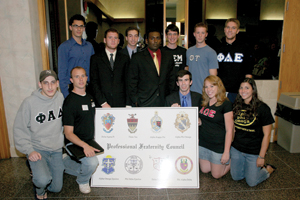
After a year and a half of negotiations, all eight professional fraternities/sororities have been officially chartered under greek life.
Both administrators and Professional Fraternity Council members were involved in the chartering process.
The eight organizations that make up the PFC are: Delta Sigma Pi (business), Delta Epsilon Mu (pre-health), Theta Tau (engineering), Alpha Omega Epsilon (engineering sorority), Phi Delta Epsilon (pre-med), Alpha Phi Omega (community service), Alpha Kappa Psi (business) and Phi Alpha Delta (pre-law). Not all of these organizations were chartered at the same time. The charters were finalized starting in October 2008 and ending in February 2009.
Gabriel Reif, Binghamton University’s greek adviser, became involved after Vice President for Student Affairs Brian Rose made the decision to bring Professional Fraternity Council (PFC) under the “greek umbrella” a year and a half ago. He was responsible for meeting with PFC leaders to advise them on their bylaws, discussing the welcoming of PFC with the Greek Leadership Board, and meeting with chapter presidents during the recognition process.
PFC members and leaders were strong advocates of the move to greek life.
“We view professional fraternities as being very similar to social fraternities and sororities,” said Dan Levin, the PFC president. “The only two differences are that most professional fraternities are co-ed, and each professional fraternity is characterized by a membership in which students are joined together by similar paths.”
These paths include pre-law, business, engineering, pre-med/health or service.
BU spokeswoman Gail Glover agreed with Levin that PFC and greek-lettered fraternities and sororities are more similar than they are different.
“Therefore, chartering them in a separate council from social fraternities, but through the Office of Greek Life was the approach decided upon,” Glover said.
In the past, professional fraternities and sororities have been placed under the Student Association and academic departments.
Levin said he believed that “greek life is the proper place where professional fraternities and sororities can receive the respect and recognition that they deserve on the BU campus.”
Reif shared Levin’s belief and said he felt good about bringing PFC under the “greek life umbrella.”
According to Reif, professional fraternities enhance BU and can now enhance greek life as well.
“It made sense to bring them all together,” Glover said.
“We’re happy to afford them the same privileges as social greek-letter organizations,” Reif said. “I’m glad that PFC leaders want to be able to hold the professional fraternities accountable through the greek conduct review process.”
After the PFC was chartered under greek life, enrollment skyrocketed.
According to Levin, there were 250 members last spring, and numbers are expected to surpass 350 for this semester.
Students that are interested in getting involved with a professional fraternity or sorority go through a similar process of those who wish to join a social-based fraternity or sorority. They must go through the rush process and attend fraternity-sponsored events and general interest meetings. Once a student receives a “bid,” which, according to Levin, “signifies that the fraternity/sorority is interested in having the student join their organization,” they begin pledging.
“Pledging is designed to build the fraternal bonds of brotherhood and sisterhood and learn about the fraternity they will one day join,” he said.
This semester, Rush Week began with the PFC United Rush Forum on Feb. 9. The Rush Forum is where students can meet fraternity members and listen to speakers explain why they should join.
“We are very proud of finally having the professional fraternities and sororities under greek life, and we look forward to working closer with the rest of the greek community in the upcoming future,” Levin said.
If you would like to learn more about the PFC, you can visit its Web site at binghamtonpfc.com.


